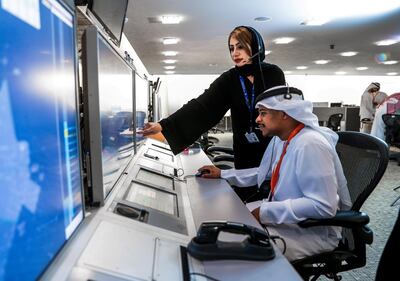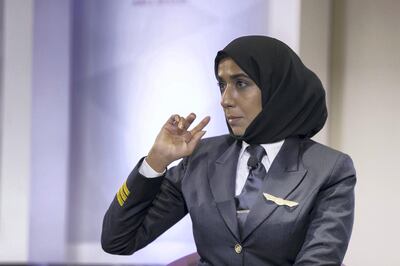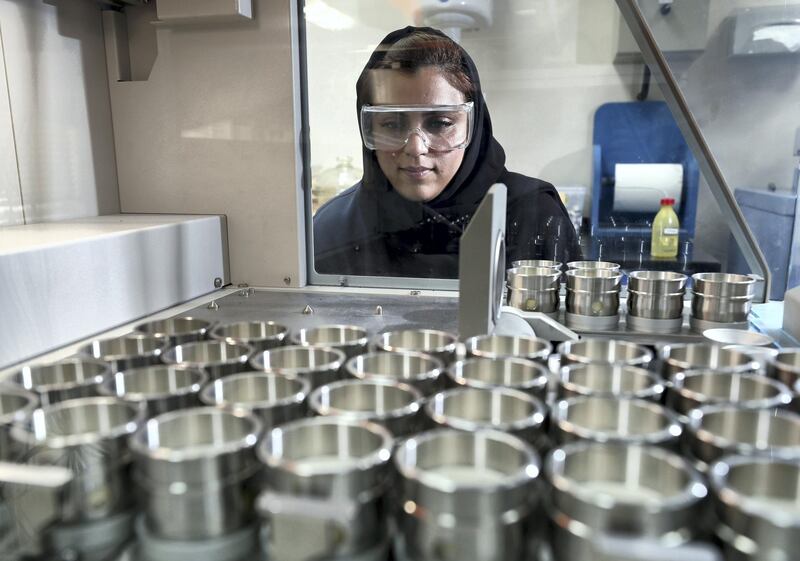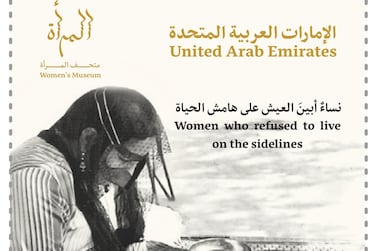As the UAE marks Emirati Women's Day, female business leaders say they are able to thrive in notoriously male-dominated industries, defying stereotypes and striving to balance traditional roles with career building.
Emirati women are making their mark in the private sector, earning top roles in fields ranging from finance to aerospace manufacturing. This is thanks to the government's Emiratisation plan, a shift away from perceptions of the public sector being more rewarding and a national plan for gender balance in the workplace.
However, local women believe they have more to offer companies beyond meeting their Emiratisation quota.
"I feel we've come a long way as Emirati women in the UAE," Mariam Al Qubaisi, sustainability manager at Etihad Airways, told The National. "Some organisations, like some sort of corporate social responsibility, meet government requirements and tick the box, but in Etihad it's different. They hire people worthy of the role; it's not just meeting a quota."
Women in the UAE make up 70 per cent of the country's university graduates, 46.6 per cent of the workforce and 10 per cent of private sector companies' leadership, according to statistics from the Ministry of Finance. The UAE ranked highest in terms of gender equality among Arabian Gulf countries, according to the 2018 UN Human Development Report. There were significant increases in the number of women in the workforce and more women than men continuing higher education.
Women currently fill more than half the positions in government entities, compared with 2 per cent in 1975.

The UAE’s Central Bank said women are playing increasingly important roles in the workforce and specifically the financial sector as they take leadership roles in banks and start their own businesses.
"Emirati women are helping to build a better and brighter future for the country," said Mubarak Al Mansoori, governor of the Central Bank of the UAE.
They are "breaking down the barriers of what it means to be a strong and influential Emirati woman in today's working world", he said.
The Central Bank employs more than 130 Emirati women, 18 of whom occupy managerial positions while three are in senior leadership roles.
Emirati women account for about 75.3 per cent of UAE citizens working in the financial sector, according to the Central Bank. This is almost 20 per cent higher than the average number of Emirati women who work in the public sector.
Local female investors are also active in the UAE capital markets, making up 51 per cent of all Emirati investors on the Abu Dhabi stock exchange.
In the energy sector, Abu Dhabi National Oil Company recently appointed its first two Emirati female chief executives.

"Gender balance is a business case," said Tayba Al Hashemi, chief executive of Al Yasat Petroleum, a subsidiary of Adnoc. "Many studies show that companies with more balanced percentages of women achieve the best performance and financial results."
Working Emirati women said the future of the workplace in the UAE can accommodate them better with more flexible work practices as they try to balance career ambitions with the responsibility of motherhood.
“The solutions here are two-fold – at home, in working with our families to secure support of all members in bringing up our children, and secondly through flexible working practices,” Ms Al Hashemi said.
Nouf Al Obaid, an Emirati associate manager at Emirates Global Aluminium's Al Taweelah refinery, began a decade ago as a graduate trainee and now oversees an all-female team of engineers. She sees herself as evidence of the opportunities available to Emirati women in non-traditional fields.
"The dynamic life in this industry is not restricted to the office. You get to go out and mix with nationalities and get experiences. You can learn as much as you want," she said.
“I don’t settle for easy, I like challenges, I don’t like to settle for routine jobs.”
Alyazia Ali Al Kuwaiti, executive director of upstream and integrated investments of petroleum and petrochemical at Mubadala Investment Company, said the UAE has championed female empowerment through strategies of inclusion and diversity.
“Women today are inextricably linked to politics, commerce and industry in the UAE, and we are seeing an increasing number of women graduate and pursue careers in the science, engineering and commercial disciplines that are core to our industry.”








